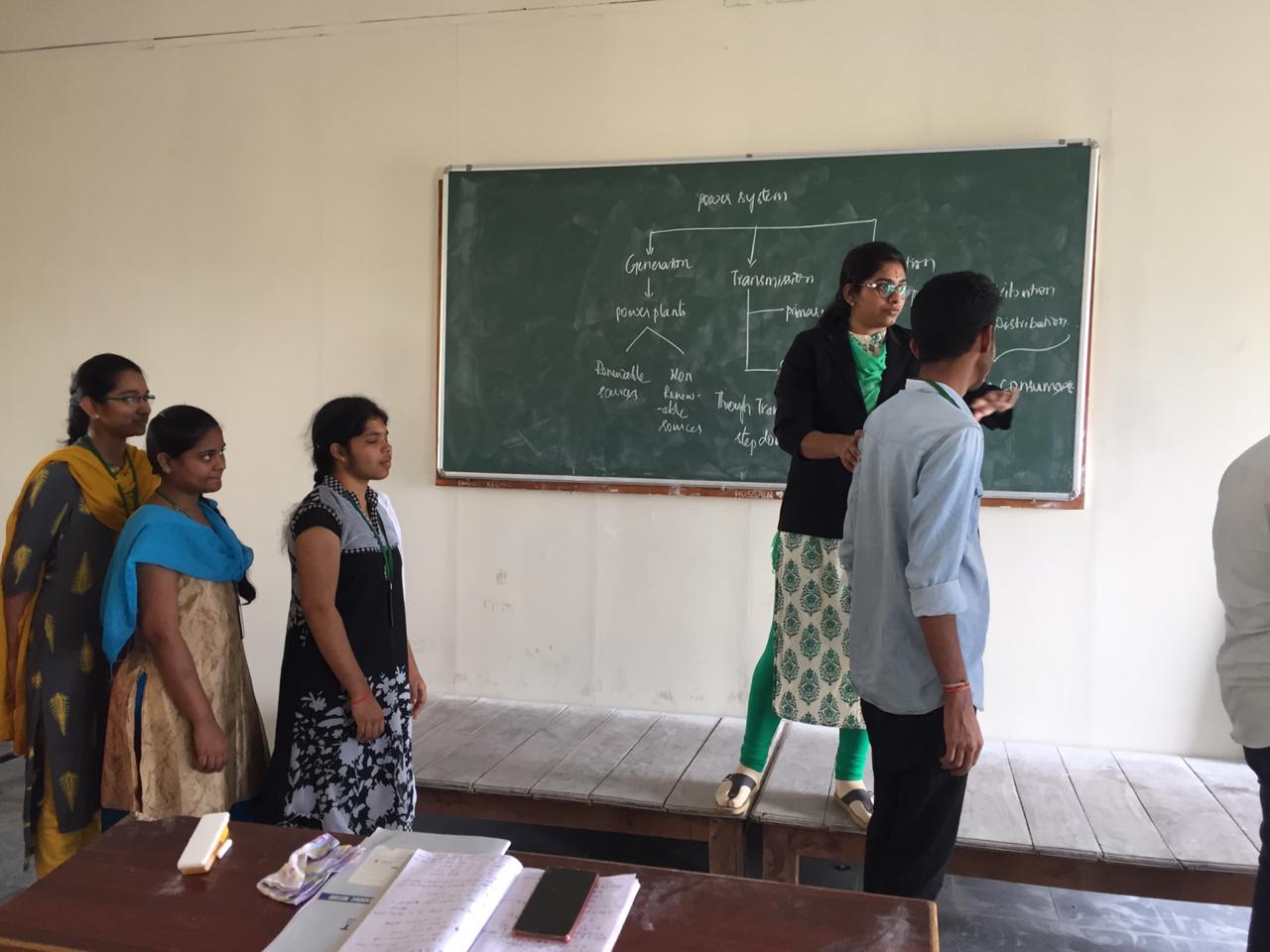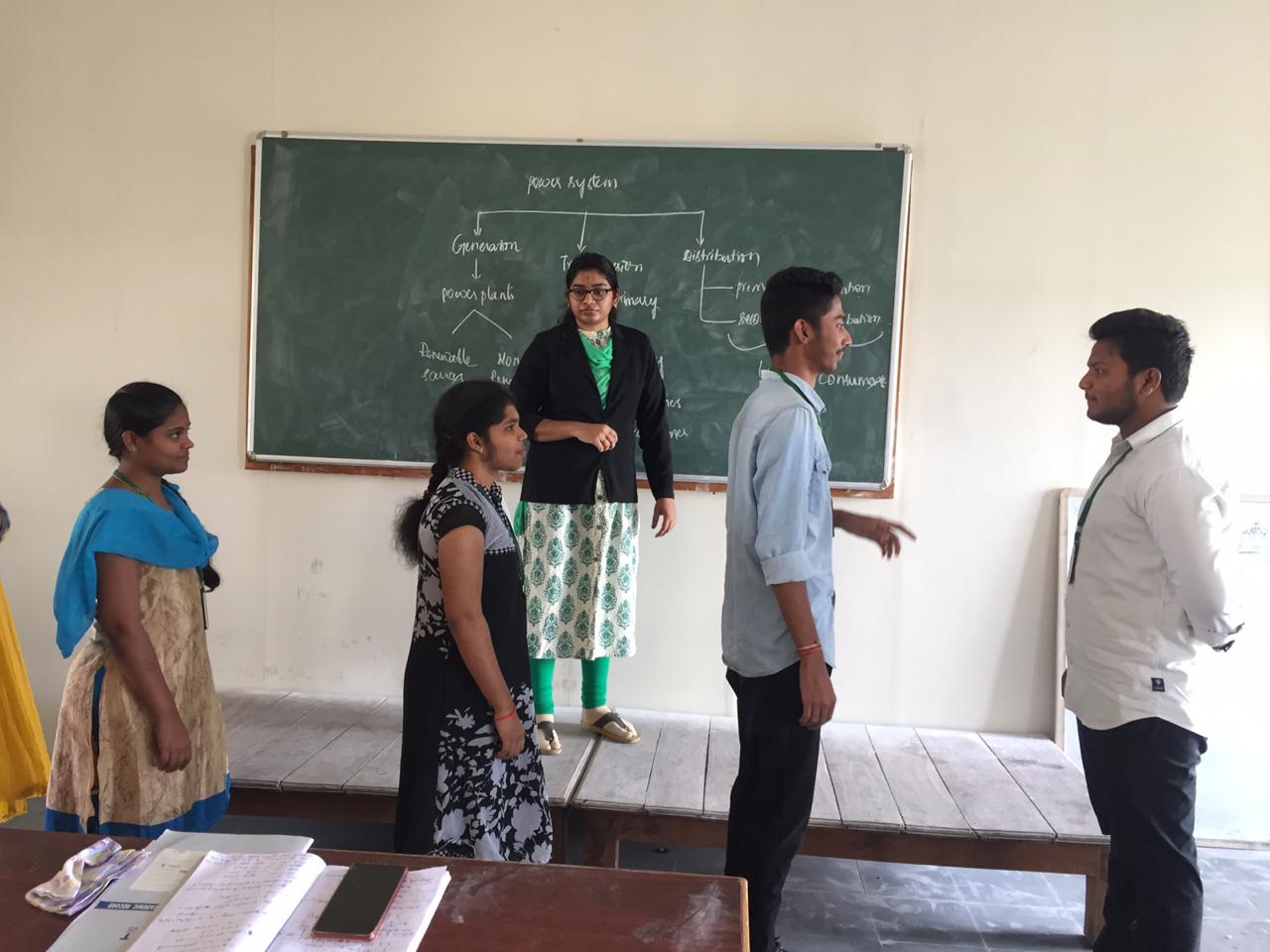Contributions of BIET EEE Department Faculty towards inculcating innovative means in Teaching and Learning are clearly elucidated both in our Department Records and on the Institute Website for peer review and critique. Our work is open to be enhanced or reproduced. Some of our inclusive ways are attractive presentations, interesting videos and mini projects, practice programs, contents beyond syllabus, assignment questions and quizzes, tutorial sessions especially for problematic and programming subjects, results analysis through interactive feedback, so forth. Proofs of the stated are comprehensively documented.
To improve the level of understanding in students, the following innovative teaching approaches are undertaken by the institution.
ICT Supported Learning
Information and Communication Technology or ICTs allow users to participate in a rapidly changing world in which work and other activities are increasingly transformed by access to varied and developing technologies. The Indian Information Technology and industry accounts for a 5.9% of the country's GDP and export earnings as of 2009, while providing employment to a significant number of its tertiary sector workforce. More than 2.3 million people are employed in the sector either directly or indirectly, making it one of the biggest job creators in India and a mainstay of the national economy.
Use of ICT
ICT tools can be used to find, explore, analyze, exchange and present information responsibly and without discrimination. ICT can be employed to give users quick access to ideas and experiences from a wide range of people, communities and cultures.
ICT in Education
Realizing the importance of Information and Communication Technology (ICT) the Ministry of Human Resource Development as per the Mission Document, ICT is the tool in education available to enhance the current enrolment rate in Higher Education, at present 15 percent to 30 percent by the end of the 11th Plan period.
The Ministry also launched a web portal named “SAKSHAT” a ‘One Stop Education Portal’. The high quality e-content once developed will be uploaded on SAKSHAT in all disciplines and subjects. Several projects are in the completion stage and are expected to change the way teaching and learning is done in India. “SAKSHAT” a ‘One Stop Education Portal’. The high quality e-content once developed will be uploaded on SAKSHAT in all disciplines and subjects. Several projects are in the completion stage and are expected to change the way teaching and learning is done in India.
SWAYAM- Study Webs of Active –Learning for Young Aspiring Minds
SWAYAM is a programme initiated by Government of India and designed to achieve the three cardinal principles of Education Policy viz., access, equity and quality. The objective of this effort is to take the best teaching learning resources to all, including the most disadvantaged. SWAYAM seeks to bridge the digital divide for students who have hitherto remained untouched by the digital revolution and have not been able to join the mainstream of the knowledge economy.
https://swayam.gov.in/
NPTEL-National Programme on Technology Enhanced Learning
The National Programme on Technology Enhanced Learning (NPTEL) was initiated by seven Indian Institutes of Technology (Bombay, Delhi, Kanpur, Kharagpur, Madras, Guwahati and Roorkee) along with the Indian Institute of Science, Bangalore in 2003. Largest online repository in the world of courses in engineering, basic sciences and selected humanities and social sciences subjects
https://nptel.ac.in/course.php
NPTEL MOOCs
NPTEL began offering open online courses in March 2014 along with certificates from the IITs/IISc for those who completed the courses successfully. Massive Open Online Courses (MOOC) is essentially an asynchronous platform and a process for teaching through pre-recorded lectures, resource video materials, lecture notes, assignments and quizzes, which are usually online and provide self assessment in regular intervals during learning. The online courses offered by NPTEL, unlike other popular MOOCs portals, include courses from all disciplines of Engineering such as Biotechnology, Ocean Engineering, Metallurgical Sciences etc apart from the popular ones such as Computer Science Engineering or Electrical Engineering. Examples of some such courses are Cell Culture Technologies, Forest Biometry, Integral equations, calculus of variations and its applications, Solid state physics, Regression Analysis,etc.
https://onlinecourses.nptel.ac.in/
DELNET- Developing Library Network
DELNET was started at the India International Centre Library in January 1988 and was registered as a society in 1992. It was initially supported by the National Information System for Science and Technology (NISSAT), Department of Scientific and Industrial Reseach, Government of India. It was subsequently supported by the National Informatics Centre, Department of Information Technology, Ministry of Communications and Information Technology, Government of India and the Ministry of Culture, Government of India.
DELNET has been established with the prime objective of promoting resource sharing among the libraries through the development of a network of libraries. It aims to collect, store, and disseminate information besides offering computerised services to users, to coordinate efforts for suitable collection development and also to reduce unnecessary duplication wherever possible.
http://delnet.nic.in/
IET Digital Library
The IET- Institution of Engineering and Technology Digital Library holds more than 190,000 technical papers from 1994 onwards for all IET journals, magazines, books, conference publications and seminar digests. Highly cited journals such as Electronics Letters are available alongside 24 research journal titles, The Journal of Engineering, the IET's new open access journal, Micro & Nano Letters, the IET's online only journal, the IET's member magazine Engineering & Technology, plus seminar digests and conference publications
http://digital-library.theiet.org/
Coursera
Coursera provides universal access to the world’s best education, partnering with top universities and organizations to offer courses online.
https://www.coursera.org/
Faculty enrolled for various NPTEL online courses for better understanding of the subject and teaching improvements.
Following are the details of the faculty successfully completed different courses in NPTEL
| S.NO | Faculty Name | Name of the Course |
|---|---|---|
| 1 | A.Nagaraju | Power system Analysis |
| 2 | V Sampath Kumar |
Fundamentals of electrical engineering |
National Programme on Technology Enhanced Learning (NPTEL) Video Lectures URL’s given below.
Faculty is using quiz test and assignments as an Assessment tool to check student understanding. This apart, students are also endowed with various resource materials by the teachers for their self-development and they are also encouraged by them to participate in various competitions of technical innovations for which again they have to participate in innovative thinking and experimentations.
The Tech-Fest organized by the college also serves to create opportunities for student’s self-development based on extra-syllabus technological knowhow.
Exclusive notes on many subjects of Electrical and Electronics Engineering has been prepared by the faculty members of this department and distributed to the students to enable the students to learn the subjects better. These notes contain important questions, critical analysis of problems with clearly depicted solutions.
| S.No | Year | Subject/Code | Units covered by These videos in the Subject | Name of the Faculty /Resource Person | RelevanceTo POs ,(PSOs) |
|---|---|---|---|---|---|
| 1 | II Year | Electrical Technology | DC Motors and Transformers | G Kamalaker Reddy | 1,2.3,4,12,(1),(2) |
Projects as the task an submit a report under the guidance of teachers Mini Projects carried out under the guidance of faculty.
| S.No | Project Title | Guide |
|---|---|---|
| 1. | Implementation of Auto intensity for solar powered LED Street light | K.Sreenivasa Rao |
| 2. | Blind Stick With Home Automation | Priyansu Chandan Behera |
| 3. | Direction And Speed Control of H-Bridge And PWM Based Dc Motor Using 8052 Micro Controller | D Chinna Kullay Reddy |
| 4. | Wireless 1-Phase Motor Starting Using RF Technology | L.Bangar Raju |
| 5. | IOT Based Remotely Monitoring Of Transformer | G Kamalaker Reddy |
| 6. | Metal Detector UsinYI3232g IOT | Ramji Tiwari |
| 7. | Multipurpose Sensing Unit For Household Appliances | Dr. A.Arul Prakash |
| 8. | Solar Based Automatic Light Control | K.Sreenivasa Rao |
| 9. | Dc Motor Soft Starter By Using Arduino Uno Board | T.Sukanth |
| 10. | Four Quadrant Operation Of DC Motor Speed Control Without Micro Controller | P.Ramesh |
| 11. | Automatic Irrigation System Using Relay Module | P. Ruth Rejoice |
| 12. | Circular Bladeless Fan | S.Marlin |
| 13. | 3 Phase Fault Analysis With Auto Reset For Temporary Fault & Trip For Permanent Fault | A.Nagaraju |
| 14. | Phase Sequence Identifaction Of 3-Phase Supply Using Sequence Indicator | Abhilasha Reddy |
| 15. | Solar Fencing For Crop Protection | D Chinna Kullay Reddy |
| 16. | Single Phase Monitoring And Prevention Of 3-Phase Load | Vasanth Reddy |
| 17. | Dual Power Generation With Solar Plus Wind Mill Generator | A.Nagaraju |
| 18. | Energy Meter Monitoring By Using IOT | T.Sukanth |
| 19. | Foot Step Power Generation System | Dr. A.Arul Prakash |
| 20. | Control Of Domestic Appliances Using TV Remote Control | P.Ramesh |
| 21. | Irrigation Motor Controlled By DTMF Method Using Mobile Phone | ABV Sravan Kumar |
| 22. | IOT Industry Automation Using RASPERRY PI | A.Nagaraju |
| 23. | ARDUNIO Based Active Dual Axis Solar Tracker | K.Sreenivasa Rao |
| 24. | Voltage Multiplier Ladder Circuit | UVSR Hareesha |
• To inculcate Research interest among students, few students are advised to undertake research oriented topics as part of their project work.
• Faculty proposes final year Project work and briefs about the objective of the projects to the final year students. Students are also encouraged to carry out external projects from industry and R&D labs.
• Students clubs has contributed to the development of student’s technical capabilities.
• BIET can play a constructive role in the following activities
• Creating conducive environment for Placements and other Competitive Examinations.
• Conducting and organizing various curricular and co-curricular activities and events
• Seeking students help during the big events like Fresher’s Day, Annual Day Celebrations, Conferences, Seminars, Workshops, Technical Quiz, etc.
• Display and explanation of advanced technologies through Multimedia Projectors.
• Course coordinators are identified and allotted for every course to evaluate and improve the quality.
• Department advisory board committee is formed to recommend improvement of COs, POs, PSOs, curricular gaps, additional training programs.
• Department organizes various seminars and workshops by internal faculty and external resource persons for students. This will enable them to acquired knowledge in current technologies and tools.
• Design Thinking to Optimize Student Learning: Students are assigned to design a project and its plan of work so that they can focus on developing creativity and build up confidence through hands-on projects.
• Focused group study: Students are divided into specific groups and are assigned specific topics related to latest trends in technology. These groups study the topics in detail through library books, internet, and library journals. Thereafter, the topics are discussed by individual groups in the class and the teacher further guides them about the specific topic. The participants are actively encouraged to not only express their own opinions, but also respond to other members and questions posed by the leader, focus groups offer a depth and variety to the discussion. Additionally, because focus groups are structured and directed, but also expressive, they can yield a lot of information in a relatively short time.
• Interactive classrooms to facilitate spot learning: Occasionally students are made to sit and allow to interact on mobile devices, tablets and laptops where the lecture classroom turns into an active learning centre with a lively forum for thought-provoking discussion, personalized learning and engaging group activities. With the help of laptop and projector, the contents from the syllabus are explained to the students. The students thereafter are given a battery of questions to be answered on spot which facilitates better learning and understanding of the topic being taught.
• Simulation classes and labs: Topics are explained to students in class rooms with e-content in the form of animation and working pictures from YouTube to make them understand more clearly about the concepts and mechanisms and their application in real life. With experiential education being the keystone of simulation, the course is a mix of theory, practice and Feedback so that students develop a strong and comprehensive understanding of how to most effectively use simulation within their education programs.
• ICT usage: ICT is a potentially powerful tool for offering educational opportunities. It is difficult and maybe even impossible to imagine future learning environments that are not supported, in one way or another, by Information and Communication Technologies (ICT). Students are provided with knowledge and proficiency in the usage of simulation. These softwares are available online and students use it for various analysis purpose. Special training is offered to the students in the lab on regular basis.
| S.NO | Nameofthe Faculty | Name of the Subject | Topic | Weblink for Animated Videos |
|---|---|---|---|---|
| 1. | Vasanth Reddy | Basic electrical engineering | Analogy between electrical systems and physical systems | https://www.youtube.com/watch?v=uhaPlyOsZ08&t=121s |
| 2. | Vasanth Reddy | ICT | Foundation programme in ICT for education | https://sincosunity.wordPress.com |
• Model presentation of mechanisms for active learning of subjects: In some subjects of Electrical and Electronics Engineering, working models on suitable scale have been displayed for the better understanding of the subject for students with the assistance of faculty members. Building such mechanisms enhances their visual understanding of the subject and promotes active learning.
| S.NO | Name | Model |
|---|---|---|
| 1. | Biogas Digester | |
| 2. | 3D Printer | |
| 3. | Equivalent circuit of 3-Winding Transformer | |
| 4. | Positive ,Negative and Zero Sequence of Three Phase Transformer | 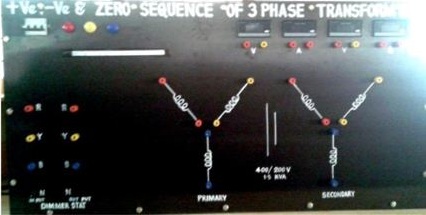 |
| 5. | Tansmission Line Model | |
| 6. | Differential Protection of Single Phase Transformer | 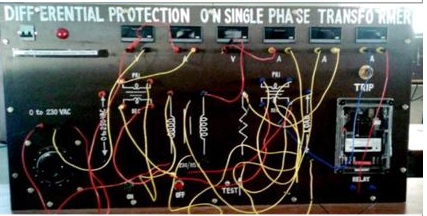 |
Short presentations
“In learning you will teach, and in teaching you will learn”
Aim:
The participants preparing the seminar/presentation eventually develop competencies like identification of presentable information, opportunity to participate in methods of scientific analysis and research procedures.
Outgrowth:
Students learn the art of communicating with peers through compact time bound presentation.
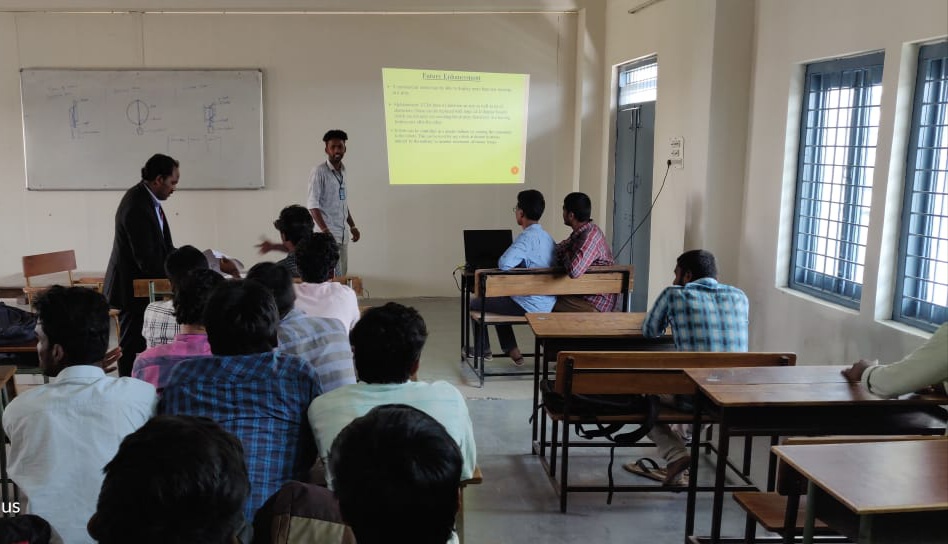
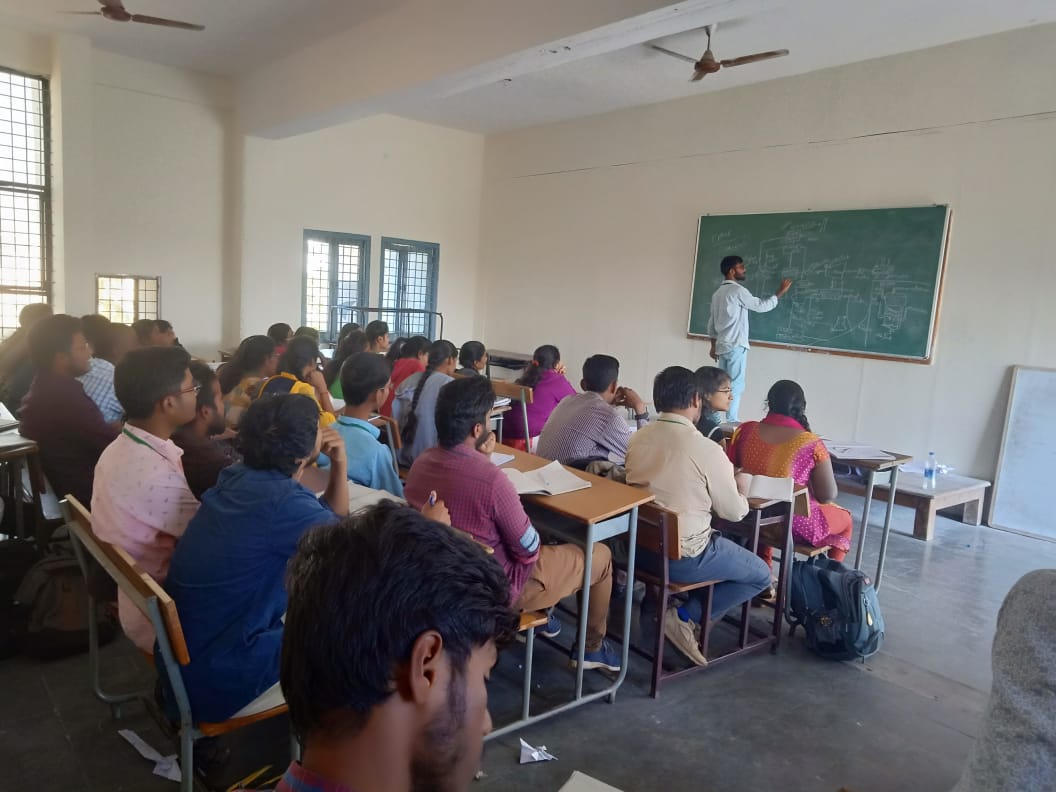
Group Projects
Aim and Outgrowth:
The aim of working in group project incorporate the advancement of: scholarly understanding capacities and aptitudes, agreeable and cooperation aptitudes, teamwork skills such as planning, management, leadership and peer support which leads to efficient task completion.
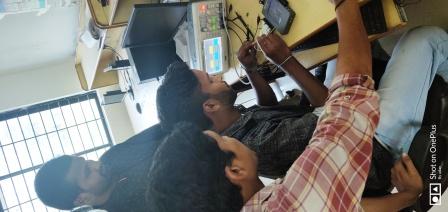
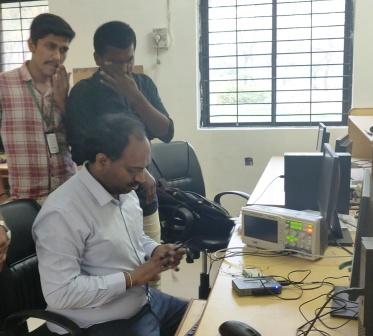
Group Discussion
“Discussion is an exchange of knowledge”
Aim:
The aim of conducting group discussion in small groups include understanding of the subject, assertiveness, team work, willingness to take the initiative, listening skills, leadership qualities and communication skills.
Outgrowth:
Discussing a topic with classmates helps in learning the topic with perfection, listening abilities, good leadership qualities, how they are communicating their thoughts and Guard against monopoly of the discussion.
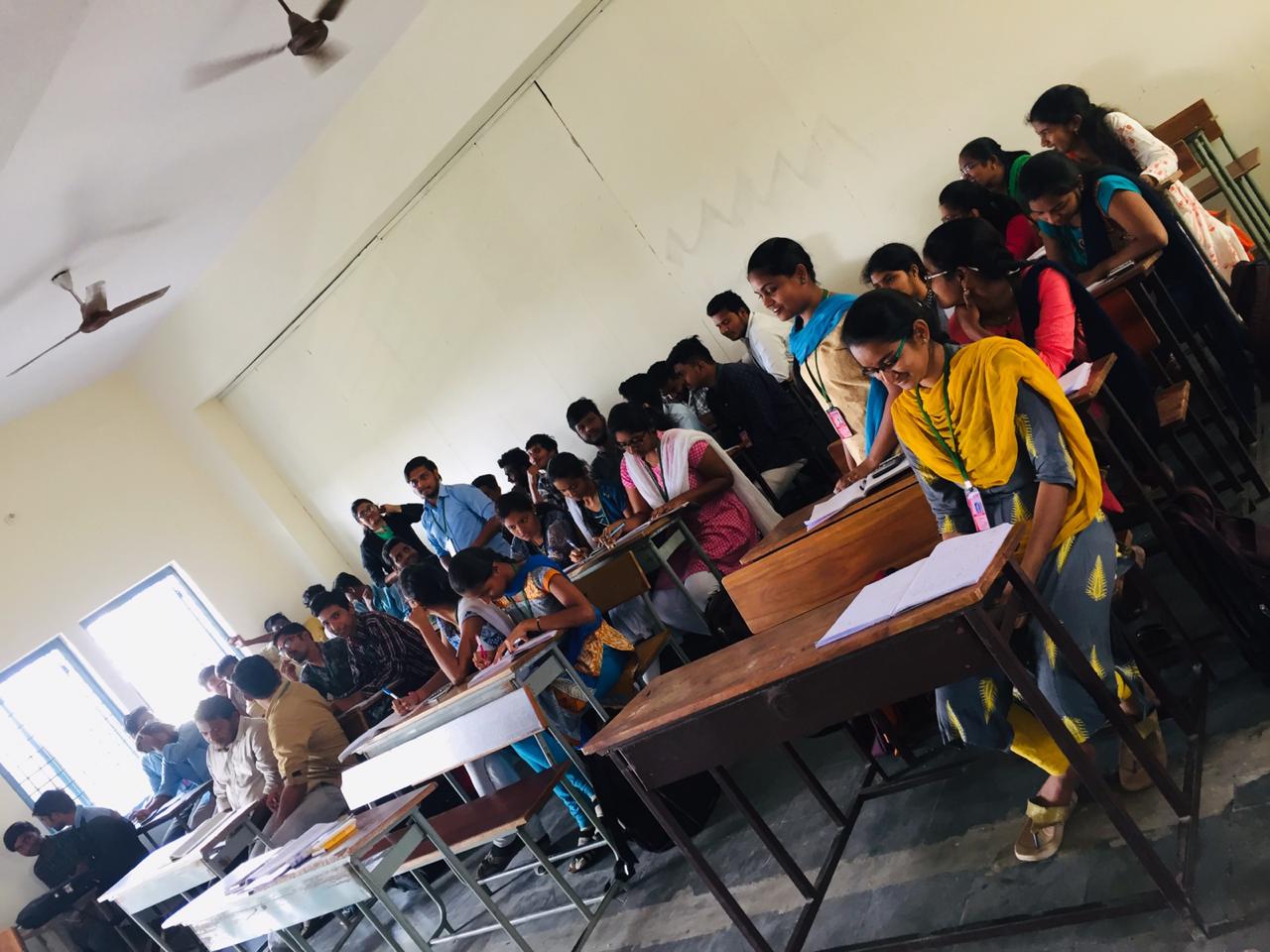
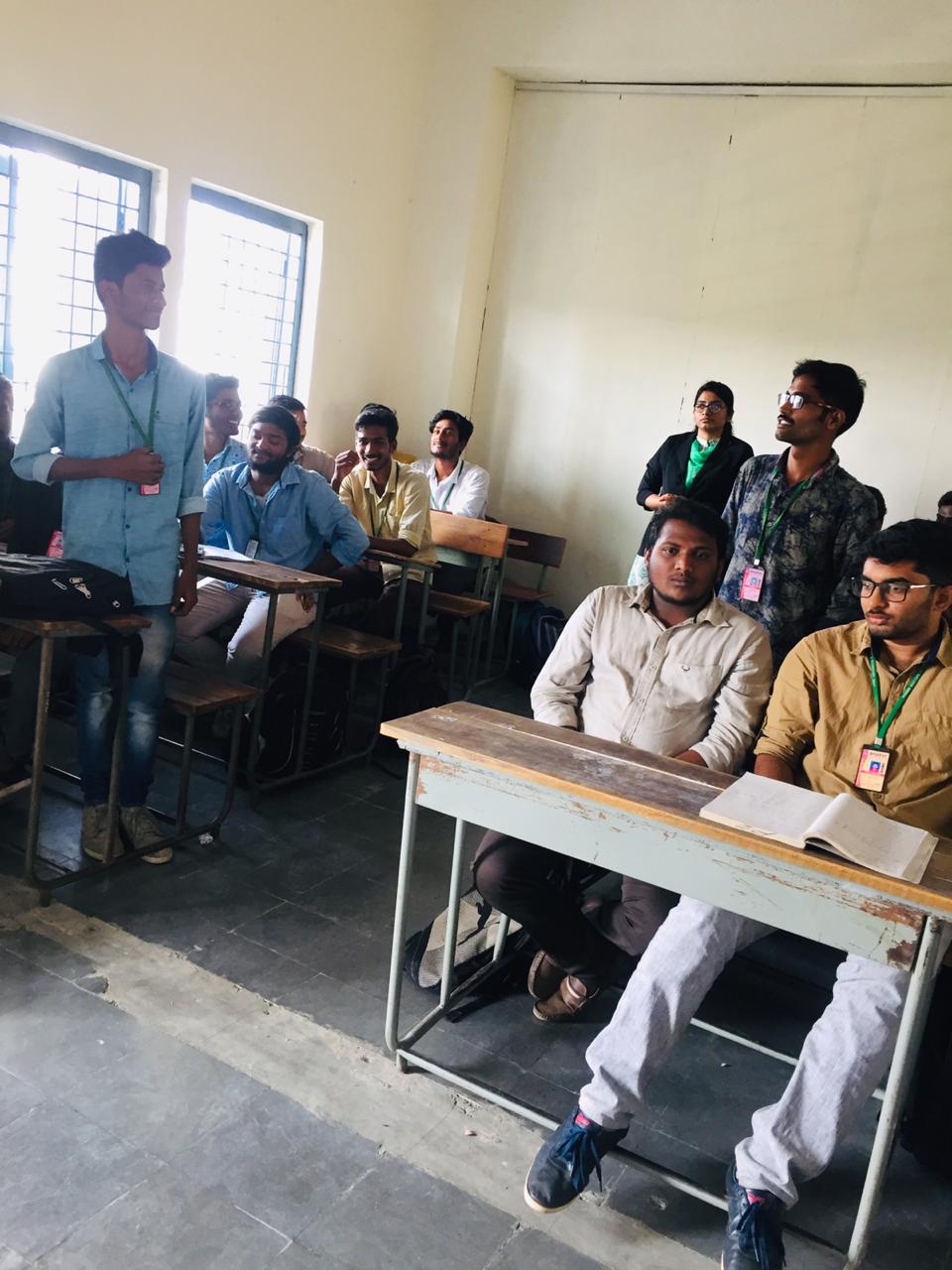
Role play
“Play is the highest form of research”
Aim:
Role play is a strategy that empowers students to investigate sensible circumstances by associating with other individuals in an oversaw route so as to create involvement and preliminary distinctive systems in a bolstered domain.
Out Growth:
A fun activity which builds confidence, creativity communication, physical development and problem solving strategy in a student.
